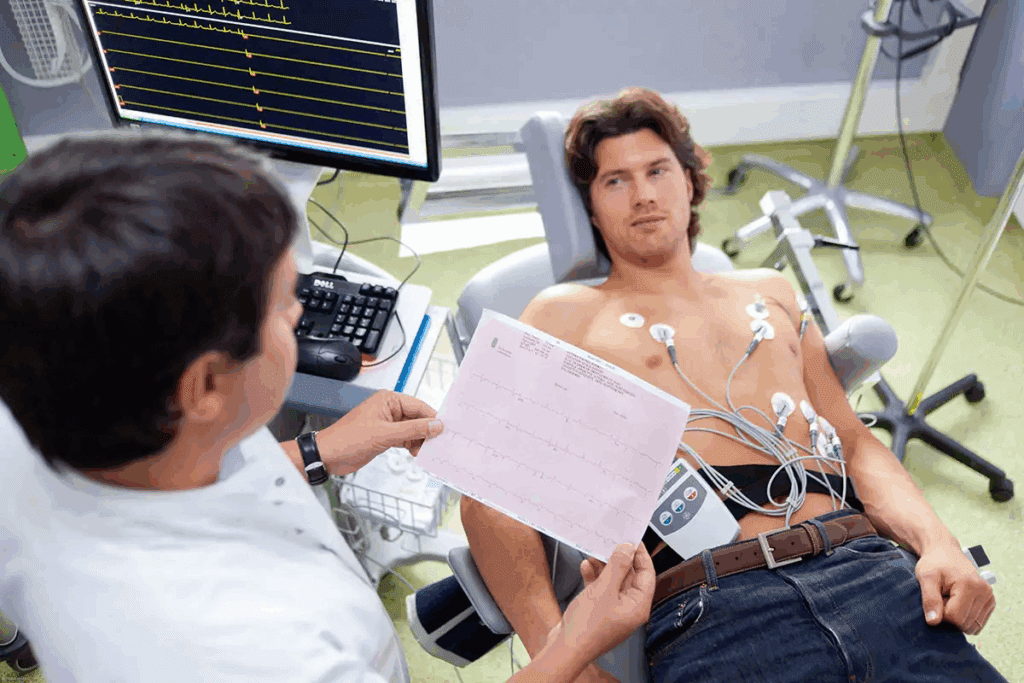Last Updated on November 25, 2025 by Ugurkan Demir

At Liv Hospital, we know how vital heart health is. We see how cardiomegaly, or an enlarged heart, affects your life. It happens when the heart muscle gets thick or the chambers grow bigger.
This issue can come from many health problems. These include high blood pressure, heart valve issues, or heart failure. Knowing cardiomegaly medical terminology helps patients understand their condition and treatment choices.
We aim to offer top-notch healthcare and support for patients from abroad. Learning about cardiomegaly is key to taking care of your heart.

It’s important to know about cardiomegaly to treat heart issues. Cardiomegaly means the heart is bigger than usual. This can happen because of high blood pressure or heart valve problems.
The term cardiomegaly comes from Greek words. “Cardia” means heart, and “megaly” means big. It’s not a disease but a sign of a problem that needs doctor’s care.
A normal heart pumps blood well. But an enlarged heart, or cardiomegaly, might not pump as well. This is because of changes in its structure.
| Characteristics | Normal Heart | Enlarged Heart (Cardiomegaly) |
| Size | Normal size relative to body size | Larger than normal |
| Pumping Efficiency | Efficient at pumping blood | May have reduced pumping efficiency |
| Chamber Size | Normal chamber size | One or more chambers may be enlarged |
Knowing these differences helps in diagnosing and treating cardiomegaly. We’ll look at causes, symptoms, and treatments next.

Cardiomegaly is not just one thing. It’s a condition with different types based on how long it lasts and how stable it is. Knowing these types helps doctors figure out the best treatment and care.
Cardiomegaly can be either short-term or long-lasting. Temporary cardiomegaly happens when the heart works harder, like during pregnancy or severe anemia. Once the cause goes away, the heart usually gets back to normal size. But, permanent cardiomegaly is caused by long-term issues like high blood pressure or heart valve problems. This makes the heart stay enlarged for a long time.
Knowing if cardiomegaly is temporary or permanent is key. Temporary cases might not need long-term care once the cause is fixed. But, permanent cases need ongoing care to avoid serious problems.
Stable cardiomegaly means the heart is enlarged but the patient feels okay and the disease isn’t getting worse. People with this condition are watched closely to make sure things don’t get worse.
Managing stable cardiomegaly means making lifestyle changes, taking medicine, and seeing doctors regularly. The aim is to keep the condition stable and avoid serious problems like heart failure or irregular heartbeats.
In summary, knowing the different types of cardiomegaly is key to good management and treatment. By understanding temporary, permanent, and stable cases, doctors can give better care. This improves patients’ lives and outcomes.
The anatomy of an enlarged heart is complex. It involves changes to the heart chambers and muscle. These changes can affect how well the heart works.
Cardiomegaly can change the heart chambers in different ways. This can make the heart less efficient. Here are some important points:
The heart muscle, or myocardium, changes a lot in cardiomegaly. These changes include:
Understanding these changes is key to managing cardiomegaly well. By knowing the anatomical changes, healthcare providers can create better treatment plans. This helps improve patient outcomes.
Cardiomegaly, or an enlarged heart, can come from many health issues. These issues affect the heart’s shape and how it works. Knowing what causes it helps doctors diagnose and treat it better.
High blood pressure is a main reason for an enlarged heart. When blood pressure is high, the heart works harder. This can make the heart muscle thicken, called hypertrophy.
This hard work can make the heart grow over time. To avoid this, managing high blood pressure is key. This can be done through lifestyle changes and medicine.
Heart valve problems are another big cause of an enlarged heart. The heart has four valves that control blood flow. If these valves are sick or damaged, the heart has to work harder. This can make the heart grow.
Issues like aortic stenosis or mitral regurgitation can cause this. Treating the valve problem is often the first step.
Congenital heart disease means heart problems from birth. These problems can affect how the heart works and grow. How much it affects someone can vary a lot.
Some heart defects need surgery to fix. Managing these conditions can help prevent the heart from getting too big.
Arrhythmias, or irregular heartbeats, can also make the heart bigger. Some arrhythmias make the heart beat too fast or irregularly. This can cause the heart to grow over time.
Other reasons for an enlarged heart include coronary artery disease, heart infections, and muscle problems like cardiomyopathy. Knowing the exact cause is important for the right treatment.
It’s important to know the symptoms of cardiomegaly to get help early. Cardiomegaly, or an enlarged heart, can show different signs. Some people might not show any symptoms at all. It’s key to know these signs to get medical help when needed.
The physical symptoms of cardiomegaly can differ from person to person. But common signs include:
These symptoms happen because an enlarged heart can’t pump blood well. This leads to fluid buildup and other problems.
In some cases, cardiomegaly can be asymptomatic, meaning no noticeable symptoms. This makes finding the problem hard, as it might only show up during a check-up for something else. Regular health checks and screenings are key, even more so for those at risk like those with high blood pressure or heart valve issues.
The severity of symptoms can vary a lot. Some people might only have mild symptoms, while others face more serious ones. How bad symptoms are can depend on why the heart is enlarged and how big it is.
Spotting the symptoms of cardiomegaly early and getting medical help can make a big difference. If you’re feeling any symptoms or worried about your heart, seeing a doctor is very important.
We use different methods to find out if someone has cardiomegaly. This includes checking the heart with tests and looking at its structure and function. It’s all about understanding the heart’s health.
First, doctors do a physical check-up. They look for signs like jugular venous distension, peripheral edema, and abnormal heart sounds. These signs can show if the heart is too big or if there’s fluid buildup.
They also listen for a third heart sound (S3) or a fourth heart sound (S4). These sounds can mean the heart is working too hard or not well enough.
Imaging tests are key in finding out if someone has cardiomegaly. Echocardiography is often used to see how big and how well the heart is working. It can spot if the heart chambers are too big or if the walls are thick.
Other tests like chest X-ray, computed tomography (CT) scan, and magnetic resonance imaging (MRI)
Laboratory tests are also important. They check for things like B-type natriuretic peptide (BNP) or N-terminal pro b-type natriuretic peptide (NT-proBNP). These tests show how well the heart is doing. Other tests, like complete blood count (CBC), electrolyte panel, and thyroid function tests, look for other health issues that might affect the heart.
When checking for cardiomegaly, doctors also look for other possible causes. This includes pericardial effusion, cardiac tumors, and other cardiomyopathies. A detailed check helps doctors figure out the right treatment.
Managing an enlarged heart involves several steps. We’ll look at medications, lifestyle changes, and surgery. Each plays a key role in helping patients feel better.
Medicines are vital in treating an enlarged heart. ACE inhibitors and beta-blockers are often used. They help the heart work less hard and lower blood pressure.
The American Heart Association says medicines can manage symptoms and slow disease progression in patients with cardiomegaly.
“The use of ACE inhibitors and beta-blockers has been shown to improve outcomes in patients with heart failure and cardiomegaly.”
American Heart Association
Changing your lifestyle is key in managing an enlarged heart. These changes can lower the risk of complications and improve heart health.
| Lifestyle Change | Benefit |
| Regular Exercise | Improves cardiovascular health and reduces symptoms |
| Healthy Diet | Lowers blood pressure and cholesterol levels |
| Smoking Cessation | Reduces cardiovascular risk |
| Weight Management | Reduces strain on the heart |
In some cases, surgery is needed to treat the heart. This can include:
Regular check-ups and monitoring are important. This includes:
By using these methods together, we can manage cardiomegaly well and improve patient outcomes.
It’s important to know the complications of cardiomegaly to manage it well. This condition can lead to serious health issues. These issues can affect your quality of life and how long you live.
Heart failure is a big risk with cardiomegaly. An enlarged heart can’t pump blood well. This causes fluid to build up in the lungs and body.
Heart failure risk factors in cardiomegaly include:
| Risk Factor | Description | Impact on Heart |
| High Blood Pressure | Prolonged high blood pressure forces the heart to work harder. | Leads to thickening of heart muscle, potentially causing heart failure. |
| Heart Valve Disorders | Abnormalities in heart valves affect blood flow. | Causes the heart to work harder, potentially leading to enlargement. |
| Congenital Heart Disease | Structural heart defects present at birth. | Can lead to cardiomegaly and increased risk of heart failure. |
Cardiomegaly also raises the risk of stroke and blood clots. An enlarged heart can cause blood to pool and clot. This can lead to a stroke. Prompt medical attention is key if you have stroke symptoms like sudden weakness or confusion.
Sudden cardiac death is another risk with cardiomegaly. The condition can mess with the heart’s electrical system. This can cause dangerous arrhythmias. Monitoring and managing cardiomegaly through regular check-ups and treatment plans can help lower this risk.
By understanding these risks and working with healthcare providers, people with cardiomegaly can reduce complications. This can improve their health outcomes.
To lower the risk of an enlarged heart, it’s key to manage factors that lead to it. Understanding the need for quick medical help is also vital. We’ll discuss how to prevent and reduce risks.
Preventing cardiomegaly starts with managing conditions that can cause it. High blood pressure is a big risk because it makes the heart work too hard, leading to enlargement.
A study in a top medical journal highlights the importance of controlling high blood pressure. It says it’s key to stop cardiomegaly and its problems.
“Hypertension is a major risk factor for cardiomegaly, and its management is key to preventing heart enlargement.”
Source: American Heart Association
| Condition | Preventive Measures |
| High Blood Pressure | Lifestyle changes, medication |
| Heart Valve Disorders | Monitoring, surgical intervention when necessary |
| Congenital Heart Disease | Early diagnosis, appropriate management |
It’s important to know the signs of cardiomegaly and when to get medical help. Symptoms include shortness of breath, fatigue, and leg swelling.
Seek medical attention if you notice these symptoms. Early treatment can stop more serious problems.
By managing conditions and getting medical help when needed, you can greatly lower your risk of cardiomegaly.
It’s key to understand cardiomegaly to manage it well. We’ve looked at what it is, its types, causes, symptoms, and how to diagnose and treat it. Knowing about cardiomegaly helps us tackle the challenges of an enlarged heart better.
Dealing with cardiomegaly means more than just treating it. It’s also about preventing it. By managing health issues and making lifestyle changes, people can lower their risk of getting cardiomegaly. We stress the importance of being aware and managing cardiomegaly to avoid serious problems and improve health outcomes.
In summary, tackling cardiomegaly needs a complete plan that focuses on diagnosis, treatment, and prevention. With the help of healthcare experts, people can take steps to keep their hearts healthy and reduce the dangers of cardiomegaly.
Cardiomegaly is when the heart gets too big. This can happen for many reasons like high blood pressure or heart valve problems.
An enlarged heart means the heart muscle gets thicker or the chambers get bigger. This can make it hard for the heart to work right.
The term for an enlarged heart is cardiomegaly.
Several things can cause cardiomegaly. These include high blood pressure, heart valve issues, and heart problems from birth.
Signs of cardiomegaly include trouble breathing, feeling very tired, and swelling in the legs. Some people might not show any symptoms at all.
Doctors use a physical check-up, imaging tests like echocardiography, and lab tests to find cardiomegaly.
Treatments for cardiomegaly include medicines, changing your lifestyle, surgery, and regular check-ups. These help manage the condition and improve health.
While you can’t prevent all cases of cardiomegaly, managing conditions like high blood pressure and getting medical help early can help.
Cardiomegaly can lead to serious problems like heart failure, stroke, and sudden death. This shows why early diagnosis and treatment are key.
Stable cardiomegaly is when the heart stays enlarged but doesn’t get worse or better. It needs ongoing care and monitoring.
Cardiomegaly can change the heart’s shape and size. This can make it hard for the heart to pump blood well.
Subscribe to our e-newsletter to stay informed about the latest innovations in the world of health and exclusive offers!